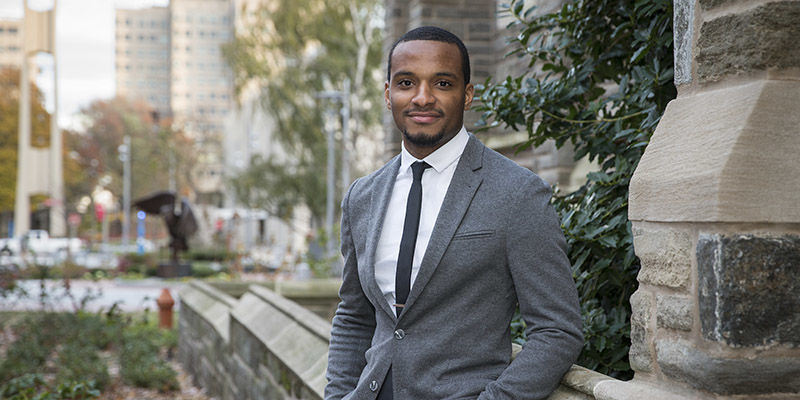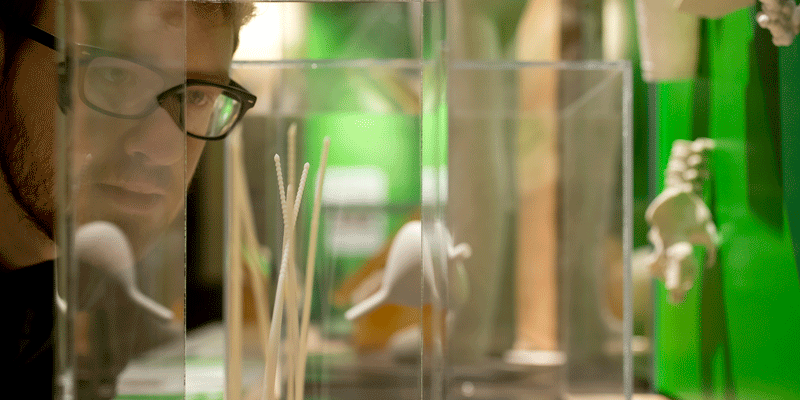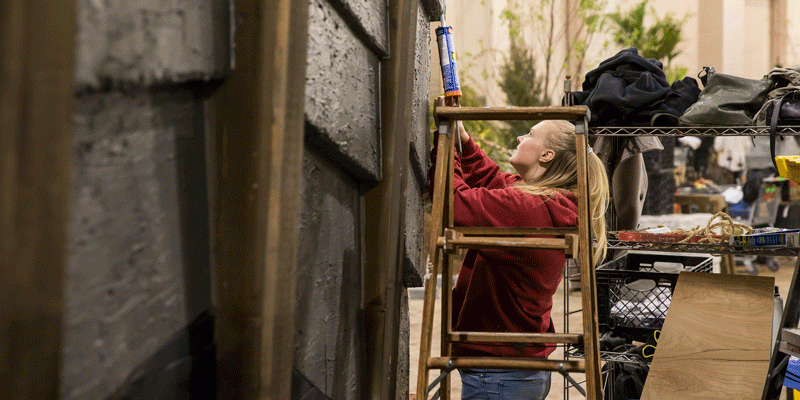Posted April 10, 2018
Marcus Forst, junior physics major, wins Temple’s first Goldwater Scholarship
The Goldwater Scholarship, “the Rhodes Scholarship of STEM,” is awarded to students in science, technology, engineering and math fields based on exemplary academic achievement.
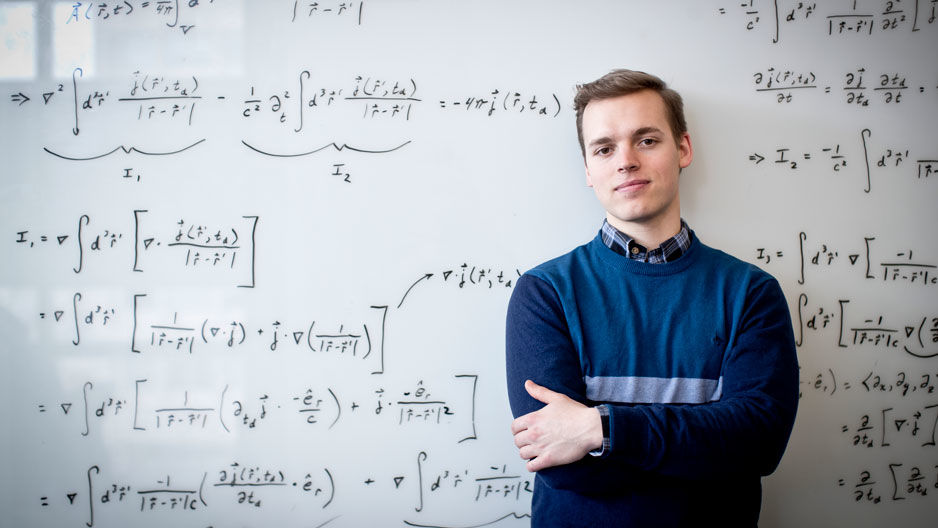
Photography By:
Ryan S. Brandenberg
Junior Marcus Forst’s journey to becoming a Goldwater Scholar hasn’t been an easy one.
When junior physics major Marcus Forst walked into the Honors Lounge at Tuttleman Learning Center March 30, he had no idea that his life was about to change. After years of hard work and adversity that included battling a serious illness, Marcus—in a room filled with mentors—learned the news: He had been selected as a 2018 Barry Goldwater Scholar, the first Temple student to ever win this honor.
The Goldwater Scholarship is the most prestigious STEM (science, technology, engineering and math) award for undergraduates, and the competition is fierce—the average GPA of recipients stands at 3.95. Granting awardees up to $7,500 per year, this scholarship is, as Honors Program Senior Director Ruth Ost puts it, “the Rhodes Scholarship of STEM.”
“This win shows that Temple has students who are the best in the nation,” Ost said.
For Forst, the journey to winning the Goldwater was a long one. After submitting an application for university nomination and being passed over on his first try, Forst—the son of two Temple alumni—spent a year and a half revising his Goldwater application.
“Scholarship essays require a very different sort of writing,” said Barbara Gorka, director of Scholar Development and Fellowships Advising. “I help students who apply revise their application essay two, three or four times.”
After submitting his application again, Forst was selected early this year as one of four nominees from Temple. Two months later, Forst was chosen by the Goldwater campus selection committee to receive the scholarship. He is one of 211 awardees this year selected from a pool of 1,280 nominees.
“I was shocked. It feels good to have accomplished this at Temple, especially since I am the first one ever,” Forst said. “I am definitely honored.”
What makes Forst’s journey to the Goldwater even more remarkable is what he’s overcome to get here: In 2015, early in his college career, Forst was diagnosed with T-cell lymphoblastic lymphoma, a type of non-Hodgkin lymphoma often found in children and teens. Forst’s illness forced him to miss nearly a year of classes, and he continues to undergo monthly treatments.
“Doing school and having chemotherapy is difficult, and then when you add on research, it’s very difficult,” Forst said.
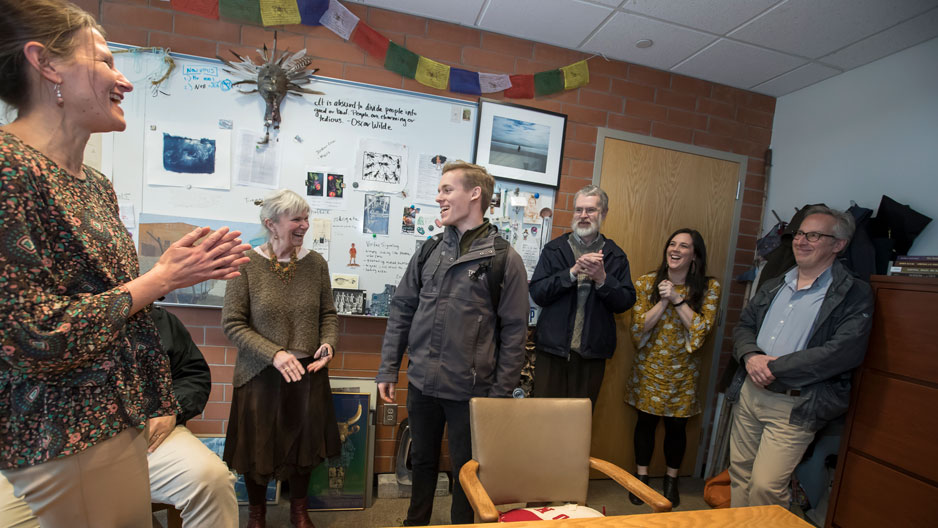
Marcus Forst learns of his Goldwater Scholarship win in the Honors Lounge at Tuttleman Learning Center on March 30.
But Forst is powering through, continuing his academic journey. After starting out at Temple as an engineering major, he realized his path might lead elsewhere.
“I knew I wanted to do more theory, so I switched to physics,” he recalled. “But I was nervous.”
After interacting with physics faculty and students and doing well in his first upper-level physics courses, though, Forst knew he made the right choice.
Forst’s professors in the Department of Physics immediately recognized him as a star student.
“Marcus is the kind of student every serious educator wants to work with,” said Jim Napolitano, professor and chair of Physics. “He combines enthusiasm, discipline and congeniality with a powerful natural talent for science.”
Forst jumped into the research world early, and it was one of his first research projects that he eventually used in his Goldwater application. He proposed a new way to study non-Joulian magnets using a scanning-tunneling microscope (STM) by coating them in a super-conductor to allow STM to gain magnetic resolution. On that research, Forst eventually published a paper.
By fall of sophomore year, Forst wanted to study more physics in the lab, so he enrolled in the College of Science and Technology’s Undergraduate Research Program (URP). He soon began working with Associate Professor Maria Iavarone and her STM group.
Marcus is the kind of student every serious educator wants to work with. He combines enthusiasm, discipline and congeniality with a powerful natural talent for science.”
-- Jim Napolitano, professor and chair, Department of Physics
“Being in URP allowed me to learn the lab, to learn the theory, and to learn the science and physics hands on,” Forst said. “It also prepared me for my independent research project—creating films of molybdenum disulfide, a material that acts like silicon which I hope will eventually be used to make atomically thin electronic devices.”
Rose McGinnis, director of URP, said having a student in the program illustrates the importance of supporting undergraduate research. Forst said the Goldwater Scholarship will support him in continuing to pursue research, as well as further academic training.
“The scholarship money will help me next year to focus on research without having to work outside the lab. And it will also help me stand out to when I apply to graduate schools,” Forst said. “I am going to get a PhD in physics, and having a Goldwater will give me a little bit of a leg up in the application process.”
Forst’s Goldwater Scholarship can be added to this year’s list of Temple student firsts, along with the university’s first Rhodes Scholar, Hazim Hardeman, and the first time the university has been recognized as a Fulbright Top Producing Institution.
“Someone said the Goldwater has been the Moby Dick for Temple,” Gorka said. “And we’ve finally got the whale.”
—Hannah Amadio
